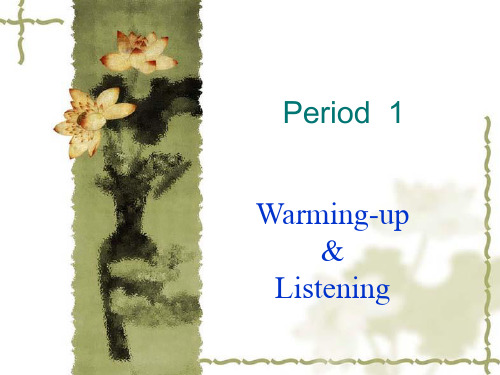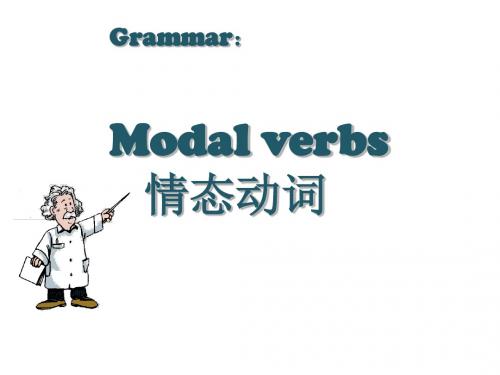人教版英语必修一Unit 1语法专题:情态动词教学精品课件
合集下载
人教版高中英语必修一UNIT1语法课件(共38张)

• 陈述句的句子结构
…say, “ .”
…said that+clasue
…say to sb , “ .” …tell sb.that+clasue
人称的变化
直接引语里的人称,变间接引语时,人称 要做相应调整,与汉语习惯相似.
1. He said, “I like it very much.” He said that he liked it very much.
He asked, “When do you harvest the wheat?”
He asked when you harvest the wheat. we harvested
They asked when we harvested the wheat.
特殊疑问句
•直接引语是特殊疑问句,变为间接引语时, 用原来的特殊疑问词引导, 并变为陈述语序.
过去完成时 Jack said Rick had been ill for many days till he died.
一般现在时 现在完成时 现在进行时 一般将来时 一般过去时 过去完成时
一般过去时 过去完成时 过去进行时 过去将来时 过去完成时
不变
1. “It is really cold.” she said to me. She told me that it _w_a_s_ really cold.
2. “When will the plane take off?” I wondered. I wondered _w_h_e_n_ _th_e_ p_l_a_n_e_w_o_u__ld_ _ta_k__e _o_ff_.
3. “Have you seen our plane yourself?” he asked the boy. He asked the boy w__h_e_t_h_e_r h_e_ h_a_d_ _se_e_n_ _th_e_i_r_ plane _h_im__s_e_lf_.
…say, “ .”
…said that+clasue
…say to sb , “ .” …tell sb.that+clasue
人称的变化
直接引语里的人称,变间接引语时,人称 要做相应调整,与汉语习惯相似.
1. He said, “I like it very much.” He said that he liked it very much.
He asked, “When do you harvest the wheat?”
He asked when you harvest the wheat. we harvested
They asked when we harvested the wheat.
特殊疑问句
•直接引语是特殊疑问句,变为间接引语时, 用原来的特殊疑问词引导, 并变为陈述语序.
过去完成时 Jack said Rick had been ill for many days till he died.
一般现在时 现在完成时 现在进行时 一般将来时 一般过去时 过去完成时
一般过去时 过去完成时 过去进行时 过去将来时 过去完成时
不变
1. “It is really cold.” she said to me. She told me that it _w_a_s_ really cold.
2. “When will the plane take off?” I wondered. I wondered _w_h_e_n_ _th_e_ p_l_a_n_e_w_o_u__ld_ _ta_k__e _o_ff_.
3. “Have you seen our plane yourself?” he asked the boy. He asked the boy w__h_e_t_h_e_r h_e_ h_a_d_ _se_e_n_ _th_e_i_r_ plane _h_im__s_e_lf_.
人教版高中英语必修一第一单元课件((共67张PPT)

4. Miss Wang says that there is no _re_a_s_o_n__ for Lisa to throw away her friendship with the boy.
5. Miss Wang asks Lisa to _ig_n_o_r_e_ her gossiping classmates and show them that she is more _g_ro_w__n_ up.
TEXT
Dear Lisa,
There is nothing wrong with you and this boy being friends and studying together. And no matter what other students say, it is possible for a boy and a girl to be just good friends. Ending your friendship with this boy would be a stupid thing to do. Not only would you lose a good friend, but you would also lose someone who is helping you with your studies.
Teenagers like to gossip, and they often see something that doesn't exist. Perhaps they can't understand your friendship with this boy. But that's no reason to throw it away. You should feel sorry for those students who have never enjoyed such a friendship. My advice is to ignore your gossiping classmates. That way you will show them that you are more grown up than they are.
5. Miss Wang asks Lisa to _ig_n_o_r_e_ her gossiping classmates and show them that she is more _g_ro_w__n_ up.
TEXT
Dear Lisa,
There is nothing wrong with you and this boy being friends and studying together. And no matter what other students say, it is possible for a boy and a girl to be just good friends. Ending your friendship with this boy would be a stupid thing to do. Not only would you lose a good friend, but you would also lose someone who is helping you with your studies.
Teenagers like to gossip, and they often see something that doesn't exist. Perhaps they can't understand your friendship with this boy. But that's no reason to throw it away. You should feel sorry for those students who have never enjoyed such a friendship. My advice is to ignore your gossiping classmates. That way you will show them that you are more grown up than they are.
情态动词语法讲解PPT课件

2表示“许可”和“不许”
a)请求对方“许可”可用can, could, may, might.
may/might较正式,could/might较委婉
表示给予“许可”通常用can/may,而不用 could/might
Could I use your phone? Yes, of course you can. Might I trouble you for a light? You may indeed.
表示将来的“必须”,常用have to的一定 形式(will/shall have to) 比较:
•We must do it again.(表示现在)
•We’ll have to do it again.(表示将来)
•表示过去的“必须”,常用had to
•I had to leave at six yesterday.
•They must be home by now.(他们现在一定到家了)
will/would表示“推测”可有三种情况
1)对特定事态的推测
A: Who’s that man over there? B: That will be George, no doubt. C: That would be George, I except.
• Can they have missed the bus?
• Yes, they may have.
may not重音落在助动词上,表示 “不可能”,重音落在否定词上,表 示“不许可” , 比较:
•He may not go tomorrow.
•He may not go tomorrow.
•所以在书面语中,表示“不可能” 常用can’t
人教版英语必修一Unit 1(语法专题:情态动词)教学课件(共21张PPT)

5 will 与 would 的用法
1 表示意志和意愿 I will never do it again. They said that they would help us.
2 表请求,建议 Will you please take a message for me? Would you please pass him the book?
My eyesight is very poor, so I have to wear glasses for reading.
tips: 在口语中 经常会用 have got to替代 have to I've got to work on Sunday. 3.must 与have to 的区别
4 shall 与 should
instead.
• A. must have studied B. might study
• C. should have studied D. would study
• 9. There was plenty of time. She_____D.
ห้องสมุดไป่ตู้
• A. mustn’t have hurried B. couldn’t have hurried
He daren’t speak English before such a crowd, dare he?
They are disappointed at the English party. They say that it ___better organized. ( D )
A.had been B. had to be C. must have been D. could have been
《情态动词讲解》课件

1
表示能力和可能性
这一用法涉及到情态动词在表示一个
表示推测和推断
2
人或事物的能力或可能性方面的应用。
情态动词还可用来表示具有推测性质
的情况和推断。
3
表示义务和建议
情态动词可用于表示某人应该或必须
表示意愿和打算
4
做的事情,或者提出建议。
用情态动词来表达某人的意愿或打算 进行的行为。
情态动词的否定和疑问
3 同时使用情态动词和实义动词时的注意事项
了解使用情态动词和实义动词时需要注意的细节。
总结
情态动词的重要性
深入理解情态动词的重要性,以及它们在语言中 的作用。
情态动词的学习方法
提供一些有效的学习方法,帮助您更好地掌握情 态动词的用法。
参考资料
书籍推荐
推荐一些深入学习情态动词的相关书籍。
网站推荐
建议一些在线资源,以便进一步学习和练习 情态动词。
2 may/might
表示推测和推断的情态 动词。
3 shall/should
表示义务和建议的情态 动词。
4 will/would
表示意愿和打算的情态动词。
5 must
表示必须和必然的情态动词。
情态动词的用法
情态动词有多种用法,我们将详细讨论其中的一些,包括表示能力和可能性、推测和推断、义务和建 议,以及意愿和打算。
特点
情态动词具有几个典型的特点,例如它们没有人称和数的变化,并且后面跟原形动词。
情态动词的种类
情态动词有几种常见的类型,我们将深入讨论其中的几个种类,包括can/could、may/might、 shall/should、will/would以及must。
1 can/could
《英语情态动词》PPT课件

(12) You can't be too careful while driving. 开车时越小心越好。
【结论6】 cannot ... too/enough表示“无论……也不过 分”;“越……越好”。用来加强语气。 (13) I couldn't but choose to wait.
【结论7】cannot but do sth. 不得不;只好 (14) They were able to put out the fire without any help from the firefighters.
(8) Can it be true? (9) You can't be serious! (10) Oh, dear, what on earth can this mean? (11) How could you do such a silly thing? 你怎么能做那样的蠢事呢? 【结论5】表示惊讶、怀疑、不相信的态度,常用在否 定句、疑问句和感叹句中。
(3)表示“偏执”,“固执” “偏要、硬要” 。 — How old are you, madam? — If you must know, I'm twice my son's age. Don't interrupt me, John. Must you force me to tell you the truth at the moment?
A computer can’t think for itself; it must be told what to do.(一般能力) 句意为:对绝大多数受到威胁时而不能起身逃跑的植物 He is a native speaker of English, so he can of course 来说,最大的问题是动物喜欢吃它们。情态动词can 可 speak English quite well.(一般能力) 表示对能力的否定。 I以表示人的能力和物的性能,故选 am starving to death. I can eat twoB bowls of rice now. (现在的能力) The biggest problem for most plants, which ___just get up and run away when threatened, is that animals like to eat them.(07湖南) A. shan’t B. B can’t C. needn’t D. mustn’t
情态动词精品课件PPT课件
第22页/共52页
• It is usually warm in my hometown in March,but it can be rather cold sometimes.
• 我的家乡在三月份通常很暖和,但有时候也会相当冷。 • Mr.Bush is on time for ever ything.How can it be that he was late for the
meeting? • 布什先生做什么事情都很准时,他怎么可能开会迟到呢? • He can't be in the classroom ,for the light has been turned off. • 他一定不在教室里,因为灯已关了。
第23页/共52页
• 2.may用于肯定句中可以用来表示推测,意为“可能”;用于否定句中也可以表示 推测,may not意为“可能不”,表示一种不太确定的语气。may在疑问句中一般不 表示推测。
You'd better not. 等)不,你不可以用。
第11页/共52页
• 3.must和have to的用法 • must表示“必须、应该”。否定形式must not(mustn't)表示“不应该、不许可、
不准、禁止”等。在回答must的问句时,否定式常用need not(needn't)或don't have to表示“不必”,而不用must not,因为must not表示“禁止”。must表 示“一定、必定”等推测意义时,一般只用在肯定句中。 • The work must be finished as soon as possible. • 这项工作必须尽快完工。
第21页/共52页
• 热点考向二 情态动词表“推测”的用法 • 表示对目前或将来情况的推测往往用“情态动词+动词原形”这种结构。 • 1.can用于肯定句中表示可能性,意为“有时会”;用于疑问句中可以表示推测,意
• It is usually warm in my hometown in March,but it can be rather cold sometimes.
• 我的家乡在三月份通常很暖和,但有时候也会相当冷。 • Mr.Bush is on time for ever ything.How can it be that he was late for the
meeting? • 布什先生做什么事情都很准时,他怎么可能开会迟到呢? • He can't be in the classroom ,for the light has been turned off. • 他一定不在教室里,因为灯已关了。
第23页/共52页
• 2.may用于肯定句中可以用来表示推测,意为“可能”;用于否定句中也可以表示 推测,may not意为“可能不”,表示一种不太确定的语气。may在疑问句中一般不 表示推测。
You'd better not. 等)不,你不可以用。
第11页/共52页
• 3.must和have to的用法 • must表示“必须、应该”。否定形式must not(mustn't)表示“不应该、不许可、
不准、禁止”等。在回答must的问句时,否定式常用need not(needn't)或don't have to表示“不必”,而不用must not,因为must not表示“禁止”。must表 示“一定、必定”等推测意义时,一般只用在肯定句中。 • The work must be finished as soon as possible. • 这项工作必须尽快完工。
第21页/共52页
• 热点考向二 情态动词表“推测”的用法 • 表示对目前或将来情况的推测往往用“情态动词+动词原形”这种结构。 • 1.can用于肯定句中表示可能性,意为“有时会”;用于疑问句中可以表示推测,意
情态动词 专题课件(共28张PPT)
➢ 5. (may/can) ____c_a_n_____you swim? 表示能力
➢ 6. Listen, please. You (may not/might not)
____m__a_y__n_o_t______ speak during this exam.
表示不允许
may, might, can, could
may, might, can, could
表示猜测
➢ 1. They (can/might) ____m_i_g_h_t___be away for the
weekend but I’m not sure.
表示许可
➢ 2. You (may/might) ___m__a_y____leave now if you
can and could
➢So he can carry heavy books. ➢ability ➢He couldn't open the door by himself. ➢ability ➢Could you open the door, please? ➢request
can and could
表示猜测(不可能)
➢7. They (can not/may not) ___c_a_n_n_o_t_______ still be out, the light is on in the house.
➢8. You (couldn’t/might not) 表示许可
____c_o_u_ld_n_’_t_______ smoke on the bus.
➢9. With luck, tomorrow (can/could) ___c_o_u_ld____be a cooler day. 表示猜测
高一上学期英语课件:情态动词 (共20张PPT)
How old can he be ?. (他可能多大了?)
He may be a teacher.
(他可能是老师) He may or may not be 33. (他或许是或许不是33岁)
He must be 33. (他一定33岁) 3
1. Mary ____ be in Paris,for I saw her in
time. 他们这时该已到北京了。
8
• 解答情态动词表示猜测的试题时,一 要清楚被猜测的时间,二要清楚有无 客观事实根据。若有客观事实根据, 则无论是肯定还是否定的猜测,猜测 语气最强且符合时间要求的为最佳答 案;若无客观事实根据,纯凭主观臆 断则猜测语气最弱且符合时间要求的 为最佳答案。
• 情态动词表示猜测时语气从强到弱的 顺序是:must,should,can,may, could,might。
情态动词 复习
1
1 情态动词表示推测的用法
情态动词must,can,could,may,might都可 用来表示推测
1. must所表示的可能性最大,最有把握,意 为“一定”。 2. can和could主要用于否定句和疑问句中 ,“可 能”,can’t或couldn’t 表示“不可能”
3. may 和 might表示现在或将来可能发生的动作 或情况,意为“或许,可能”主要用于肯定句 中,might相对于may 来说,表示的可能性更小一 些。may/might not “可能不”
19
Goodbye!
20
1. They will ______ run this machine on
their own in three months.
A. can
B. could
He may be a teacher.
(他可能是老师) He may or may not be 33. (他或许是或许不是33岁)
He must be 33. (他一定33岁) 3
1. Mary ____ be in Paris,for I saw her in
time. 他们这时该已到北京了。
8
• 解答情态动词表示猜测的试题时,一 要清楚被猜测的时间,二要清楚有无 客观事实根据。若有客观事实根据, 则无论是肯定还是否定的猜测,猜测 语气最强且符合时间要求的为最佳答 案;若无客观事实根据,纯凭主观臆 断则猜测语气最弱且符合时间要求的 为最佳答案。
• 情态动词表示猜测时语气从强到弱的 顺序是:must,should,can,may, could,might。
情态动词 复习
1
1 情态动词表示推测的用法
情态动词must,can,could,may,might都可 用来表示推测
1. must所表示的可能性最大,最有把握,意 为“一定”。 2. can和could主要用于否定句和疑问句中 ,“可 能”,can’t或couldn’t 表示“不可能”
3. may 和 might表示现在或将来可能发生的动作 或情况,意为“或许,可能”主要用于肯定句 中,might相对于may 来说,表示的可能性更小一 些。may/might not “可能不”
19
Goodbye!
20
1. They will ______ run this machine on
their own in three months.
A. can
B. could
人教必修一Unit 1 语法课-优质课件(精简版)
(1) 限定词包括: 冠词(a/an/the) 指示代词(this/that/these/those等) 物主代词( my/your/his/her/our/their等) 不定代词(some/ no/ neither/both等) 数词(one/two/first/second等)。
(2) 多个形容词修饰名词时,其顺序为: 限定词—数词—描绘词—出处—材料性质—类别—名词。 如:a small round table/a tall gray building/a dirty old brown shirt/a famous German medical school/an expensive Japanese sports car 顺口溜记忆: 县(限定词)官(观点形容词)行(形状形容词)大(大小形容词)令(年龄新旧 形容词)射(颜色形容词)国(国家等出处形容词)才(材料质地等形容词) 。
短语或词组(Phrases)是具有一定意义但不构成句子或从句 的一组词。了解短语知识对于快速、准确地理解句e the underlined parts of the sentences and sum up what they have in common. 1. (教材原文P16) The first week was a little confusing. 2. (教材原文P16) The building is so big that I'm completely lost. 3. (教材原文P16) My first French class was very confusing. The
自主探究 ① These red roses are for you, 这些红玫瑰是送给你的。 (名词短语these red roses 的构成形式为:限定词十形容词+名词,该短 语在句中充当主语) ② I have three close friends. 我有三个要好的朋友。 (名词短语three close friends的构成形式为:限定词+形容词+名词,该短 语在句中充当宾语)
- 1、下载文档前请自行甄别文档内容的完整性,平台不提供额外的编辑、内容补充、找答案等附加服务。
- 2、"仅部分预览"的文档,不可在线预览部分如存在完整性等问题,可反馈申请退款(可完整预览的文档不适用该条件!)。
- 3、如文档侵犯您的权益,请联系客服反馈,我们会尽快为您处理(人工客服工作时间:9:00-18:30)。
4 shall 与 should
1用于一,三人称疑问句表示征求对方的意见 和 向对方请示 Shall the driver wait ?What shall we do next ?
2 用于 二 三人称陈述句表示命令警告,允诺, 威胁以及法律条文规定 You shall go with me / He shall be punished You shall have the book when I finish it All the children shall go to school at the age of seven.
人教版英语必修一Unit 1语法专题:情态动词教学精品课 件
7 ought to 的 用法
1 表应该与 should 的 区别 You ought to take care of him. You are his father .You ought to get him to receive good education 2 表推测 He ought to be home by now. He must be home by now.
3 表功能 This machine won't work. 4 表示习惯性动作与used to有何区别 Fish will die without water. Every evening ,he would sit by the window.
人教版英语必修一Unit 1语法专题:情态动词教学精品课 件
----Could I use your dictionary?我可以用一下你的字典吗? -----Yes, go ahead.可以,用吧(或Yes, you ou tell me the way to the zoo?你能告诉我怎么去动
人教版英语必修一Unit 1语法专题:情态动词教学精品课 件
人教版英语必修一Unit 1语法专题:情态动词教学精品课 件
5 will 与 would 的用法
1 表示意志和意愿 I will never do it again. They said that they would help us.
2 表请求,建议 Will you please take a message for me? Would you please pass him the book?
may/ might as well 还是 -----好 we may as well stay where we are
人教版英语必修一Unit 1语法专题:情态动词教学精品课 件
人教版英语必修一Unit 1语法专题:情态动词教学精品课 件
must 和 have to
• 1. must 表示有做某一动作的必要或义务,强调主观 看法,可译为“必须,应该”
can 与could 1.表示能力:会 在表示过去的能力时用could I can swim. 我会游泳
I could not read such a easy book when I was 7 years old. 我七岁时连如此简单的书都看不懂
2.表示允许,许可。常用在口语中 此时could不表示时态,而是表 示比can语气上客气些
reading. tips: 在口语中 经常会用 have got to替代 have to I've got to work on Sunday. 3.must 与have to 的区别
人教版英语必修一Unit 1语法专题:情态动词教学精品课 件
人教版英语必修一Unit 1语法专题:情态动词教学精品课 件
情态动词的用法
2
情态动词的基本用法特点
1).没有人称和数的变化 2.不能直接跟宾语,必须搭配实义动词 或be动词的原形除 ought 和 have 外 3.情态动词的过去式往往不表示时态
高中阶段都学过哪些情态动词呢 1 can / could / be able to 2 may/might 3 must / have to 4 shall / should 5 will / would 6 need / dare 7 ought to
人教版英语必修一Unit 1语法专题:情态动词教学精品课 件
2 may / might
1 May I watch Tv after supper? Yes you may /No ,you mustn't.(请求许可) 2 It may be true ./ she may come tomorrow / He might have some fever(推测) 3 May you succeed ! May you have many more days as happy as this one(祝愿)
You mustn't smoke when you walk in the woods. You could start a fire.那样可能会引起火灾。 could/ can have done 表示对过去事情的推测
She can't have gone to school. It's Sunday.
Everyone must obey the rule. We must do everything step by step. 2. have to因客观使主语不得不做某事 You can't turn left here. You have to turn right. My eyesight is very poor, so I have to wear glasses for
物园吗?
3.表示推测,用于肯定句(can罕见),否定句或疑问句。
但更常见于疑问句与否定句,在此种用法中,can 与 could没有时态的区别,只有可能性大小的区别。can表 示推测的可能性比could大。
Can he be ill at home?(他会是生病在家吗?) He cannot be at home.(他不可能在家)
1用于一,三人称疑问句表示征求对方的意见 和 向对方请示 Shall the driver wait ?What shall we do next ?
2 用于 二 三人称陈述句表示命令警告,允诺, 威胁以及法律条文规定 You shall go with me / He shall be punished You shall have the book when I finish it All the children shall go to school at the age of seven.
人教版英语必修一Unit 1语法专题:情态动词教学精品课 件
7 ought to 的 用法
1 表应该与 should 的 区别 You ought to take care of him. You are his father .You ought to get him to receive good education 2 表推测 He ought to be home by now. He must be home by now.
3 表功能 This machine won't work. 4 表示习惯性动作与used to有何区别 Fish will die without water. Every evening ,he would sit by the window.
人教版英语必修一Unit 1语法专题:情态动词教学精品课 件
----Could I use your dictionary?我可以用一下你的字典吗? -----Yes, go ahead.可以,用吧(或Yes, you ou tell me the way to the zoo?你能告诉我怎么去动
人教版英语必修一Unit 1语法专题:情态动词教学精品课 件
人教版英语必修一Unit 1语法专题:情态动词教学精品课 件
5 will 与 would 的用法
1 表示意志和意愿 I will never do it again. They said that they would help us.
2 表请求,建议 Will you please take a message for me? Would you please pass him the book?
may/ might as well 还是 -----好 we may as well stay where we are
人教版英语必修一Unit 1语法专题:情态动词教学精品课 件
人教版英语必修一Unit 1语法专题:情态动词教学精品课 件
must 和 have to
• 1. must 表示有做某一动作的必要或义务,强调主观 看法,可译为“必须,应该”
can 与could 1.表示能力:会 在表示过去的能力时用could I can swim. 我会游泳
I could not read such a easy book when I was 7 years old. 我七岁时连如此简单的书都看不懂
2.表示允许,许可。常用在口语中 此时could不表示时态,而是表 示比can语气上客气些
reading. tips: 在口语中 经常会用 have got to替代 have to I've got to work on Sunday. 3.must 与have to 的区别
人教版英语必修一Unit 1语法专题:情态动词教学精品课 件
人教版英语必修一Unit 1语法专题:情态动词教学精品课 件
情态动词的用法
2
情态动词的基本用法特点
1).没有人称和数的变化 2.不能直接跟宾语,必须搭配实义动词 或be动词的原形除 ought 和 have 外 3.情态动词的过去式往往不表示时态
高中阶段都学过哪些情态动词呢 1 can / could / be able to 2 may/might 3 must / have to 4 shall / should 5 will / would 6 need / dare 7 ought to
人教版英语必修一Unit 1语法专题:情态动词教学精品课 件
2 may / might
1 May I watch Tv after supper? Yes you may /No ,you mustn't.(请求许可) 2 It may be true ./ she may come tomorrow / He might have some fever(推测) 3 May you succeed ! May you have many more days as happy as this one(祝愿)
You mustn't smoke when you walk in the woods. You could start a fire.那样可能会引起火灾。 could/ can have done 表示对过去事情的推测
She can't have gone to school. It's Sunday.
Everyone must obey the rule. We must do everything step by step. 2. have to因客观使主语不得不做某事 You can't turn left here. You have to turn right. My eyesight is very poor, so I have to wear glasses for
物园吗?
3.表示推测,用于肯定句(can罕见),否定句或疑问句。
但更常见于疑问句与否定句,在此种用法中,can 与 could没有时态的区别,只有可能性大小的区别。can表 示推测的可能性比could大。
Can he be ill at home?(他会是生病在家吗?) He cannot be at home.(他不可能在家)
